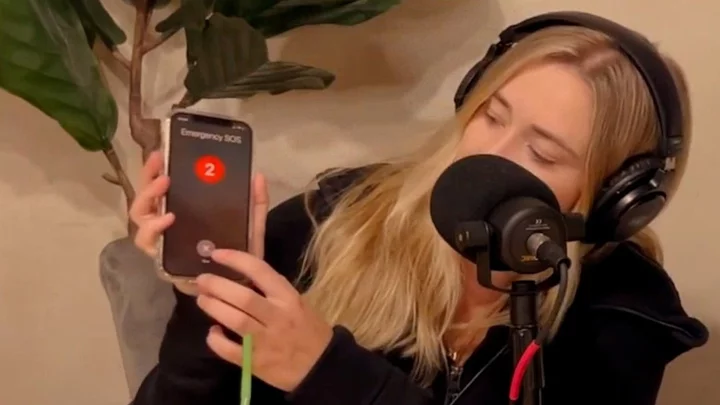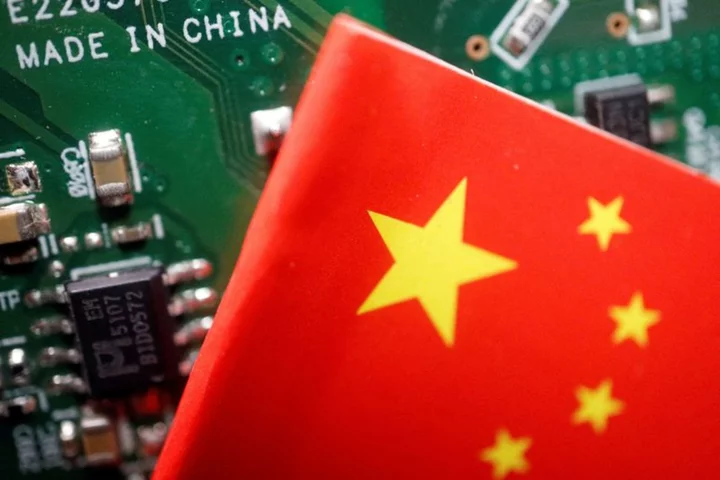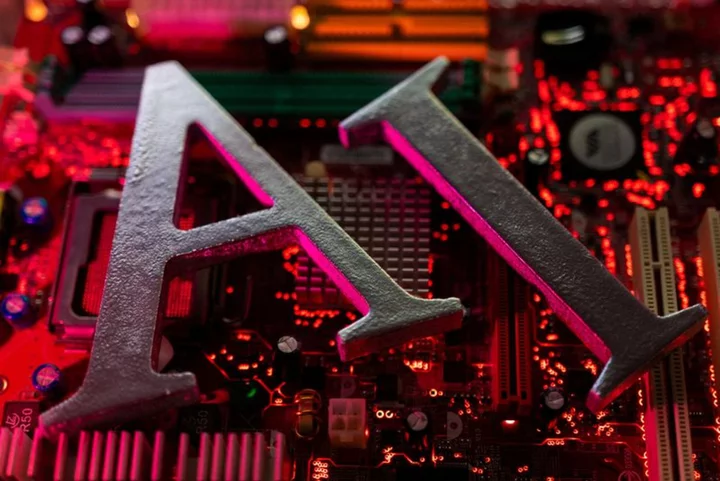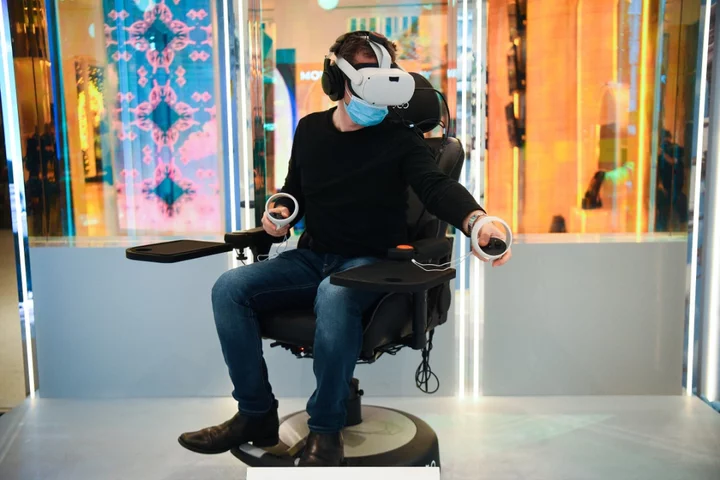
Fintech Nubank to launch personal loans for Mexican market
By Valentine Hilaire MEXICO CITY Nubank, one of Latin America's biggest fintech companies, announced on Tuesday the launch
2023-09-05 19:25

This hidden iPhone emergency setting could potentially save your life
A podcast host is going viral after revealing a little-known iPhone hack that could potentially save your life. Morgan Absher, from Two Hot Takes, demonstrated by how heading into your settings and altering the 'Emergency SOS' buttons, you can easily dial 999 should you need to. "I’m constantly scared about getting kidnapped. Getting kidnapped is my biggest fear", she explains of how she learnt the hack. By turning it on, users can choose to either press and hold their volume and power buttons simultaneously to call the emergency services, or press the power button five times for the same result. Sign up to our free Indy100 weekly newsletter
2023-09-05 18:50

London and Paris Face Heat Waves as Greece Braces for Floods
The unseasonably hot weather across northwest Europe will extend into next week, with London set to exceed 30C
2023-09-05 16:28

China's Leapmotor looks to sell EV tech as it targets export growth
MUNICH China's Leapmotor needs to increase its sales by five times or more to survive a consolidating EV
2023-09-05 16:25

Exclusive-China to launch new $40 billion state fund to boost chip industry, sources say
By Julie Zhu, Kevin Huang, Yelin Mo and Roxanne Liu HONG KONG/BEIJING China is set to launch a
2023-09-05 16:16

Cryptoverse: Venture capital still haunted by crypto chaos
By Lisa Pauline Mattackal and Medha Singh For venture capitalists, the scars of bitcoin's disastrous 2022 run deep.
2023-09-05 13:21

Baidu CEO says more than 70 large AI language models released in China
BEIJING More than 70 large artificial intelligence language models with over 1 billion parameters have been released in
2023-09-05 12:15

Thoma Bravo Nears Deal for NextGen Healthcare
Thoma Bravo is in advanced talks to buy health records software company NextGen Healthcare Inc., according to people
2023-09-05 10:48

China's 360 to open AI model to the public - state media
BEIJING China's tech firm 360 Security Technology will open its AI model, Zhinao, to the public, China's state-backed
2023-09-05 09:26

Virtual reality ‘being used to groom and abuse children’ – NSPCC
Offenders are using virtual reality (VR) to groom and sexually abuse children, as well as share illegal images of abuse, according to new research from the NSPCC. A report commissioned by the children’s charity on VR and immersive technologies said the online spaces at the heart of the technology are being used by offenders to not only interact with children, but also to simulate acts of abuse. It warned that offenders are being desensitised to their own behaviour because of the anonymity such spaces provide through their use of customisable, digital avatars to represent each person present, which the report said offenders are using to hide behind. Virtual reality platforms are based around a person wearing a headset, which immerses them in a virtual world where they can see and interact with other users as well as consume content, and is seen by some as the next iteration of the internet. However, the study warned that these VR worlds invite the creation of tighter-knit offender communities, which could be used to share child sexual abuse material and lead to an escalation in harmful behaviours. These shocking findings should be a wake-up call to us all about the harm young people are facing when engaging with immersive technology Richard Collard, NSPCC In response, the NSPCC has called on tech firms to do more to ensure virtual reality platforms are safe by design by introducing better child safety features and reporting systems. It has also called on the Government to provide more guidance, funding and learning opportunities to law enforcement on how to deal with virtual reality platforms. And with the Online Safety Bill due to continue its passage through Parliament this week, the charity said the Government should review the Bill’s safety regime on a regular basis to ensure that it keeps up with emerging technologies and harms to make sure they are adequately covered under the law. Richard Collard, head of child safety policy at the NSPCC, said: “These shocking findings should be a wake-up call to us all about the harm young people are facing when engaging with immersive technology. “Technology will continue to progress, and so must we to ensure that we can understand the existing and emerging risks that young people face in these virtual spaces. “As the Online Safety Bill completes its passage through Parliament, it is vital that new and emerging technology forms a crucial part of the online safety regime. “This will only be made possible through clear collaboration between educators, parents, policymakers, and the technology industry.” Earlier this year, crime statistics data obtained from police forces in England and Wales by the NSPCC showed that virtual reality was recorded eight times in crime reports, the first time the technology has been specifically mentioned, the charity said. Read More Charity boss speaks out over ‘traumatic’ encounter with royal aide Ukraine war’s heaviest fight rages in east - follow live Russian cyber-attacks ‘relentless’ as threat of WW3 grows, expert warns Warner Music sign first digital character Noonoouri and release debut single Met should thoroughly investigate cyber security practices, say experts
2023-09-05 07:21

Spy attire: US investing $22m in surveillance socks and other wearable tech
The federal government is reportedly investing at least $22m into developing clothes that “can record audio, video, and geolocation data.” According to a 22 August press release from the office of the Director of National Intelligence’s Intelligence Advanced Research Projects Activity (IARPA), the research and development arm of the organisation, “recently launched a cutting-edge program that aims to make performance-grade, computerized clothing a reality”. The DNI touted the SMART ePANTS program, which stands for Smart Electrically Powered and Networked Textile Systems, that “seeks to develop clothing with integrated audio, video, and geolocation sensor systems that feature the same stretchability, bendability, washability, and comfort of regular textiles,” IARPA stated. They will be used by the intelligence community, IARPA wrote. Since the surveillance technology will be woven into the clothing, “Intelligence Community staff will be able to record information from their environment hands-free, without the need to wear uncomfortable, bulky, and rigid devices.” For example, according to the release, the technology could “assist personnel and first responders in dangerous, high-stress environments, such as crime scenes and arms control inspections without impeding their ability to swiftly and safely operate.” The SMART ePANTS program’s mission is to to incorporate “sensor systems” into clothes, like shirts, pants, socks, and underwear. The Intercept reported that the federal government has dedicated at least $22m in funding to the program. It’s unclear just how big of a gamble IARPA might be making with its investment. Its website describes itself as investing “federal funding into high-risk, high-reward projects to address challenges facing the intelligence community.” “A lot of the IARPA and DARPA programs are like throwing spaghetti against the refrigerator,” Annie Jacobsen, author of a book called The Pentagon’s Brain about ​​the Defense Advanced Research Projects Agency, told the outlet. “It may or may not stick.” Dr Dawson Cagle, an IARPA program manager leading the SMART ePANTS program, said that while he is “proud of the intelligence aspect” of the program, he’s “excited about the possibilities that the program’s research will have for the greater world.” He said that he was inspired in part to create the program by his father, who was a diabetic, and therefore had to monitor his health multiple times a day. His father’s experience paired with the research that supports that the components of a computer “have already been developed, just as individual pieces,” he explained. If you can convert all of the components into a single, wearable device, the program’s goal will have been achieved, Dr Cagle said. Ms Jacobsen warned that the advancement of smart wearables could lead to future concerns over biometric surveillance by the government. “They’re now in a position of serious authority over you. In TSA, they can swab your hands for explosives,” Ms Jacobsen told The Intercept. “Now suppose SMART ePANTS detects a chemical on your skin — imagine where that can lead.” But IARPA pushed back on this assertion, as spokesperson Nicole de Haay told the outlet: “IARPA programs are designed and executed in accordance with, and adhere to, strict civil liberties and privacy protection protocols. Further, IARPA performs civil liberties and privacy protection compliance reviews throughout our research efforts.” Read More Swedish citizen goes on trial on charges of collecting information for Russia Seoul's spy agency says Russia has likely proposed North Korea to join three-way drills with China Biden says he is ‘disappointed’ at Xi Jinping skipping India’s G20 summit Vodafone users say they can’t call people World’s first solar-powered hybrid truck tested on public roads Apple is about to make a huge change to the iPhone that it never wanted to do
2023-09-05 06:27

Matthew Hedges: Foreign Office apology to UAE torture academic
Matthew Hedges' ordeal sparks a review into internal guidance on torture and mistreatment cases.
2023-09-05 02:15
